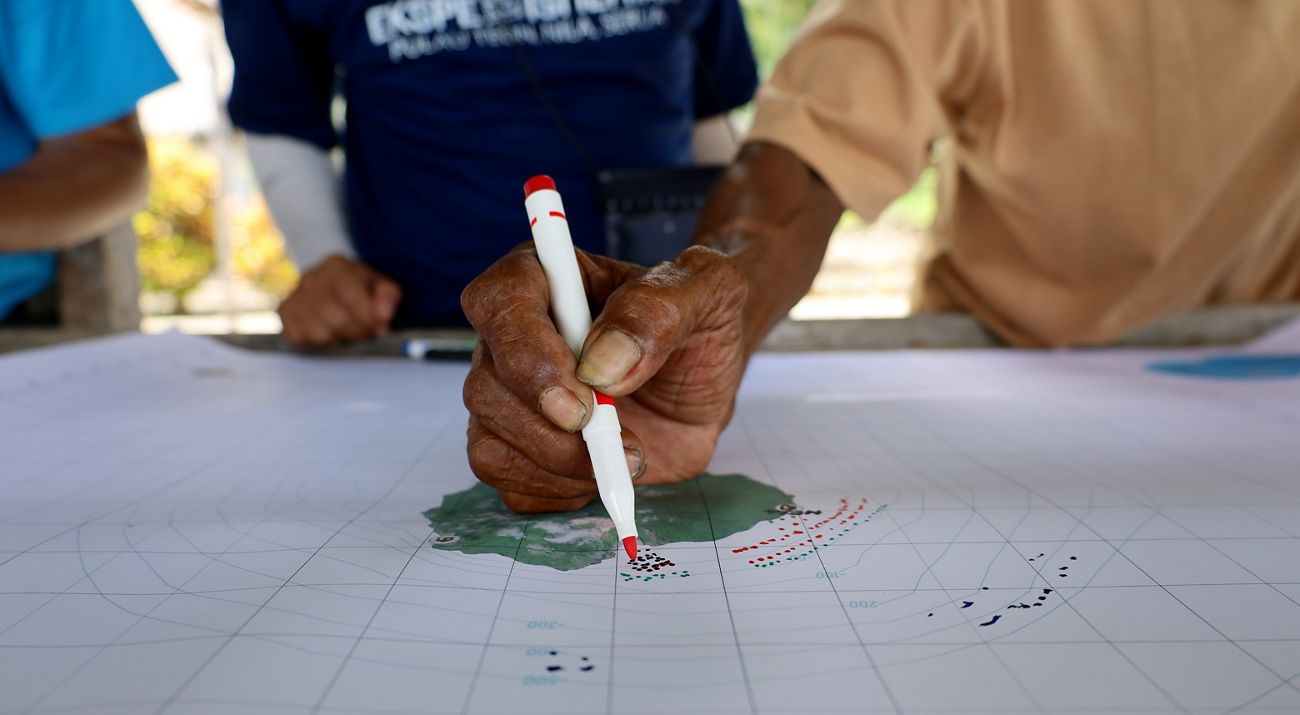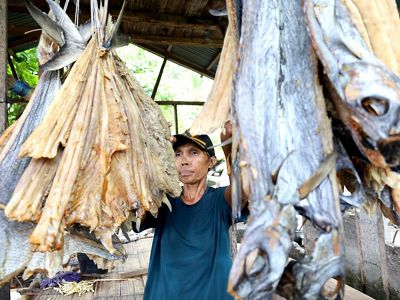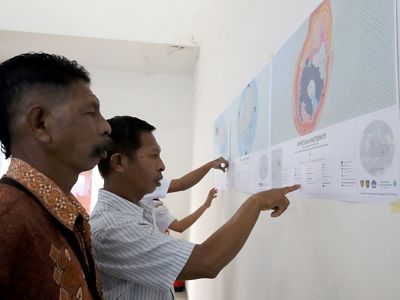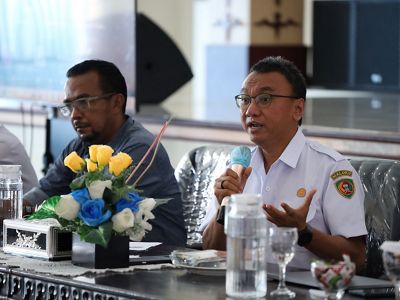Designing Conservation Areas in Teon, Nilam, and Serua Waters Enters The Zoning and Working Group Formation Stages

Media Contacts
-
Adia Puja Pradana
Communications Specialist Ocean Program YKAN
Yayasan Konservasi Alam Nusantara
Email: adia.pradana@ykan.or.id
The commitment to preserving marine ecosystems and ensuring the sustainability of fishery resources in the Banda Sea region, Maluku Province, continues to be strengthened through multi-stakeholder collaborative efforts. The Maluku Provincial Government, in collaboration with the Central Maluku District Government, academics from Pattimura University, local communities, and Yayasan Konservasi Alam Nusantara (YKAN), held a Dissemination Workshop and Work Plan Formulation for the Establishment of Conservation Areas in the Waters of Teon, Nila, and Serua (TNS), held on 23-24 July 2025 at the Office of the Marine and Fisheries Service (DKP) of Maluku Province, Ambon.
This activity is a vital part of a strategic initiative in designing and planning the establishment of Conservation Areas in Maluku Provincial waters, including the waters surrounding TNS Islands, covering an area of 685,000 hectares. This program will be integrated with other marine conservation areas in Maluku Province, which by the end of 2023, will cover more than 4.7 million hectares spread across 11 regencies/cities in Maluku. Additionally, this region is part of Fisheries Management Area (WPP) 714 and contributes about 10% of the national fishery production.

"The TNS region, located within the Banda Sea ecoregion, is part of the global coral triangle. This area holds extraordinary ecological value, from healthy coral reefs to marine mammal migration routes, all of which require data-driven protection and collaboration. Equally important is ensuring that this area can be managed fairly and participatively, recognizing the roles and rights of local communities as the primary guardians of the ecosystem, in line with the 5th Mission of the Governor and Deputy Governor of Maluku, namely, Sustainable (Ethical, Responsive, and Accountable) Management of Coastal Zone Environments and Small Islands and Natural Resources," said Erawan Asikin, Head of DKP Maluku Province, in his opening remarks.
During the workshop, a joint team comprising DKP Maluku, Pattimura University, and YKAN presented scientific survey results for mapping coastal resource potentials conducted in April 2025. This survey documented the characteristics of coastal and marine ecosystems in the TNS area, including socio-economic surveys and potential coastal resource data. This data forms the basis for designing zoning plans for Conservation Areas in TNS Waters as part of the submission procedure to the Ministry of Marine Affairs and Fisheries (KKP).
Gino Valentino Limmon, Director of the Maritime and Marine Center at Pattimura University, stated that the biophysical survey results indicated high ecological complexity in the TNS marine area, with several areas having healthy coral cover above 60%, and the presence of marine megafauna such as green turtles, sperm whales, dugongs, and hammerhead sharks.
“The biophysical surveys we conducted show that TNS waters are still relatively healthy and serve as critical habitats for various endemic marine species. This data provides a strong scientific foundation for preparing conservation zoning based on scientific evidence and the needs of local communities,” Gino explained.
In addition to biophysical surveys, the workshop also discussed the results of socio-economic and fisheries surveys conducted on the three islands. These surveys aim to: inventory and document active fishing activities in the region; provide socio-economic and demographic data of fishing communities, including income profiles, household structures, market access, and dependency on marine resources; support the design of Community-Based Fisheries Management (CBFM) inclusive conservation areas; and serve as the basis for fair and sustainable area management decision-making.
This survey also facilitated active participation with fishing communities as part of a participatory approach, ensuring that management policies are adaptive to the needs of local communities. Local community participation is a key element in the conservation area planning process. Residents of Teon, Nila, and Serua Islands have been actively involved in discussions and activities centered around Free, Prior, and Informed Consent (FPIC).
“Essentially, we, the TNS community, strongly support the management plan for the Conservation Area in TNS Waters. This step demonstrates our seriousness, as a local community, in safeguarding the sea as a source of life, not just for today, but also for the future generations of Teon, Nila, and Serua,” said Ronald Wonmaly, Sub-district Head of Teon Nila Serua, who attended the event.

This inclusive conservation model opens collaborative spaces where local wisdom and scientific approaches become part of the area management system. This is crucial to ensure that conservation areas not only protect ecosystems but also address the economic and social needs of coastal communities.
Long-Term Commitment and Strategic Collaboration
To ensure the sustainability of marine and fishery resources and the protection of marine resources in Maluku Province, comprehensive management mechanisms are needed to meet national targets for the expansion and effective management of Marine Conservation Areas. Therefore, the Maluku Provincial Marine and Fisheries Service, together with YKAN as one of the government partners, will assist in designing zoning plans and strengthening the management of Conservation Areas in TNS Waters, emphasizing inclusivity principles.
“In implementing this support, YKAN and its partners have collected supporting data and information, as well as conducted other supporting studies to serve as references for formulating zoning plan drafts for the establishment of Conservation Areas. The inclusive scientific approach we carry out with local partners is the key to successful, sustainable marine conservation,” said Muhammad Ilman, YKAN Marine Program Director.
The workshop also successfully formulated the work plan and timeline of the Working Group (Kelompok Kerja (Pokja)) for zoning Conservation Areas in TNS Waters, including subsequent steps toward official designation by the Minister of Marine Affairs and Fisheries. The Pokja comprises diverse cross-sectoral parties, including the Ministry of Marine Affairs and Fisheries, the Maluku Provincial Government, the Central Maluku District Government, academics, development partners, and local communities from Teon, Nila, and Serua.

“This Pokja will later be responsible for refining zoning documents, conducting further public consultations, and developing community-based monitoring and governance mechanisms,” he added.
With the roadmap, zoning framework, and multi-stakeholder collaboration in place, it is hoped that the Conservation Area in the Waters of Teon, Nila, and Serua can soon be officially designated as part of the national effort to protect Indonesia's marine ecosystem, integrating conservation, sustainable fisheries, and community empowerment simultaneously.
Yayasan Konservasi Alam Nusantara (YKAN) is a scientific-based non-profit organization that has been present in Indonesia since 2014. With the mission of protecting lands and waters as life support systems, we provide innovative solutions to realize the harmony of nature and humans through effective natural resource management, prioritizing a non-confrontational approach, and building a network of partnerships with all stakeholders for a sustainable Indonesia. For more information, visit ykan.or.id.

